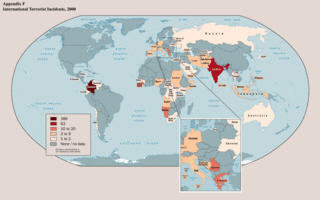Monday, March 06, 2006
Terrorism: The Danger within Other Dangers: Overview
Second post in the 10 Greatest Dangers to the Western World series
Part 1
Welcome to the second post in the 10 Greatest Dangers series, this post focusing on terrorism and its recent role in world events. I decided to use the poll to determine what my next topic would be, and was surprised when, last Monday, terrorism was at the top of the list. But if that’s the people’s choice, so be it.
 I almost didn’t include terrorism in my list of the Greatest Dangers because, unlike all the other dangers, it is a tool, a weapon of other dangers. While the Israel/Palestine and Pakistan/Russia conflicts can be considered either major fronts in the conflict between West and Middle East covered in my last post or seen as unique conflicts, and while Dilution of Freedom can be considered a result of that same conflict or as a unique trend that started long before the present conflict with the Middle East, terrorism (in its present form) can only be seen as a weapon.
I almost didn’t include terrorism in my list of the Greatest Dangers because, unlike all the other dangers, it is a tool, a weapon of other dangers. While the Israel/Palestine and Pakistan/Russia conflicts can be considered either major fronts in the conflict between West and Middle East covered in my last post or seen as unique conflicts, and while Dilution of Freedom can be considered a result of that same conflict or as a unique trend that started long before the present conflict with the Middle East, terrorism (in its present form) can only be seen as a weapon.
Without the conflict between West and Middle East, terrorism as we know it today would not exist, and would not be the great issue that concerns us all. Terrorism today is not the same as the terrorism we witnessed coming out of Ireland and other locations; it’s global, it not only attacks the perceived oppressors in the front yard, but the oppressor’s home society an ocean away, and all the oppressor’s allies and friends. Instead of considering innocent victims to be unfortunate necessities, modern terrorism specifically targets innocents.
These differences in terrorism are the direct result of the conflict with the Middle East, and their use of terrorism as one weapon in the larger conflict. So why even consider it as a unique danger? Because the ramifications of terrorism are vastly different from the ramifications of any other threat we face today! And those ramifications need to be examined and dealt with if we are ever going to truly win the war on terror. And because, according to Daled Amos, we had 6,991 people murdered and 12,382 people injured from terrorism in 2005. That makes terrorism a significant danger.
OK, before I go further, let me stop for a second and talk about the goals of this post. I believe that by exploring these dangers, and broadening our understanding of the conflicts, we can begin to work towards avoiding these dangers and a better future. I also think that today, more than ever, it is essential to understand the peril of the world today, and to make decisions with an eye towards their effects on all the future of all people.
Some of what I say will not be popular; will be down-right scandalous. By all means, disagree with me, enter into debate, and tell me and everyone how you believe it to be. But the object here is not to spew hatred, so show respect for everyone’s opinions, even if you wholeheartedly disagree.
The first step in understanding this danger is defining it, but this is not as easy as you may think. The UN has been unsuccessfully trying to define a terrorist or terrorist action for years. Soccer Dad reprints an article in September 2005 on the latest attempts by the UN to define terrorism:
Previous efforts, extending over 8 years, had failed to come up with an agreed terrorism definition. This time there was high hope that the UN would “get it right.” Drawing from the recommendations of its own High Level Panel on Threats, Challenges and Change, Secretary General Kofi Annan had put great emphasis on a definition of terrorism and a strategy aimed at combating terrorism and terrorism support and financing. It was time to make it clear, he said, that any deliberate killing of civilians for political purposes was terrorism. He lobbied for, and received strong support for such a definition from international leaders at both the Riyadh Counter-Terrorism Conference and the Madrid Terrorism Summit. So what happened?
Unfortunately, too many countries, particularly in the Middle East, are still wedded to the same terrorist tactics they have used for decades to address their perceived grievances. They maintain that there must be a right to resistance against occupation and that such right encompasses tactics of violence against civilians. Such a "right to resistance" concept carries with it nefarious implications not only for the Palestinian-Israeli conflict, but also for the coalition presence in Iraq and Afghanistan.
Take a look at Kofi Annan’s definition of terrorism. “Any deliberate killing of civilians for political purposes.” Can we say that the US’ presence in Iraq would not include any deliberate killings of civilians for political purposes? I don’t believe so. Yet, I don’t consider our presence in Iraq to be terrorism. For this reason, Soccer Dad brings up an excellent point: he indicates that a clear definition of occupation, and its relation to terror, would help clarify the difference. We’ll look at this in some depth in the second post on terrorism, dealing with the definitions roots of terrorism.
We’ll also look at a definition presented in The Metropolis Times in September 2005 which I think is closer to the truth. In his post “What is Terrorism”, Adam says: “A decent definition of terrorism could be something like "the murder of civilians and destruction of property in order to provoke fear in the population at large for political gain." Now that’s an interesting definition! It injects the motive of inspiring fear into the definition, and that I believe to be closer to the heart of the most recent mutation of terror. The roots of the word speak of this motivation, and it is what I believe makes terror so different from the other dangers.
In the third post on terrorism, we’ll examine the geography of this issue. Terrorism has a different meaning to Israelis than it does to Americans. It means something different to someone from Iraq than it does to someone from London. We’ll examine the roll geography plays in terrorism, and how different countries deal with the challenges terrorism offer. We’ll also look at an excellent set of posts, called the Bloody Borders Project, which has recorded and mapped out every terrorist attack for the past 4.5 years (since 9/11). This leads to some amazing insights, and deserves more in-depth analysis.
And in the fourth post, we’ll examine some things we can do to fight terrorism. I know, people out there are shaking their heads, saying “if a terrorist wants to succeed a terrorist will succeed, and there’s nothing we can do about it.” Well I hate to tell you, but you are absolutely, 100% dead wrong. We can do things and we must do things, on a personal level and on a government level, to prevent terrorism from spreading. Deep Thought has this to say:
First, we have to recognize that fighting terrorism is a three pronged battle: security at home, aggressive action abroad, and 'counter-recruiting'-- preventing terrorists from reaching their objective in the streets, slums and countryside of countries where they have roots. To fight a successful war on terrorism, we need a plan for all three.
For clarification, the third section of Deep Thought’s piece includes his “hearts and minds portion”, reaching out the communities who are fostering this terrorism and trying to improve relations. And that is very important, and we will focus on that. But there are other ways that individuals can help too, and we’ll talk about them, and examine how individuals play a roll in fighting terrorism in Israel and other countries, where the number of unsuccessful terrorist attacks by far outweigh the number of successful terrorist attacks.
No question, terrorism is making a significant impact in the lives of millions, maybe billions of people around the world. It affects how we live our lives, and injects a level of fear that is constant, that always exists. Who knows when the next terrorist attack will occur, or where? The grocery store, gas station, my office building? Will it be me, my neighbor, my lover, my best friend that’s there at the wrong time? These are the questions we now face daily. And these are the issues we will explore this week.
technorati tags: Terror, Terrorism, Danger, West, Weapon, Middle East, Murder, United Nations, Kofi Annan, definition, roots, fear, Israel, Iraq, London,
10 Greatest Dangers to the Western World Series
The Conflict between the West and the Middle East
Posted by Scottage at 1:35 PM /
| |



 I almost didn’t include terrorism in my list of the Greatest Dangers because, unlike all the other dangers, it is a tool, a weapon of other dangers. While the Israel/Palestine and Pakistan/Russia conflicts can be considered either major fronts in the conflict between West and Middle East covered in my last post or seen as unique conflicts, and while Dilution of Freedom can be considered a result of that same conflict or as a unique trend that started long before the present conflict with the Middle East, terrorism (in its present form) can only be seen as a weapon.
I almost didn’t include terrorism in my list of the Greatest Dangers because, unlike all the other dangers, it is a tool, a weapon of other dangers. While the Israel/Palestine and Pakistan/Russia conflicts can be considered either major fronts in the conflict between West and Middle East covered in my last post or seen as unique conflicts, and while Dilution of Freedom can be considered a result of that same conflict or as a unique trend that started long before the present conflict with the Middle East, terrorism (in its present form) can only be seen as a weapon. 